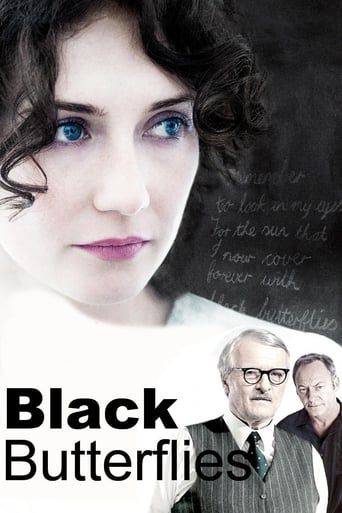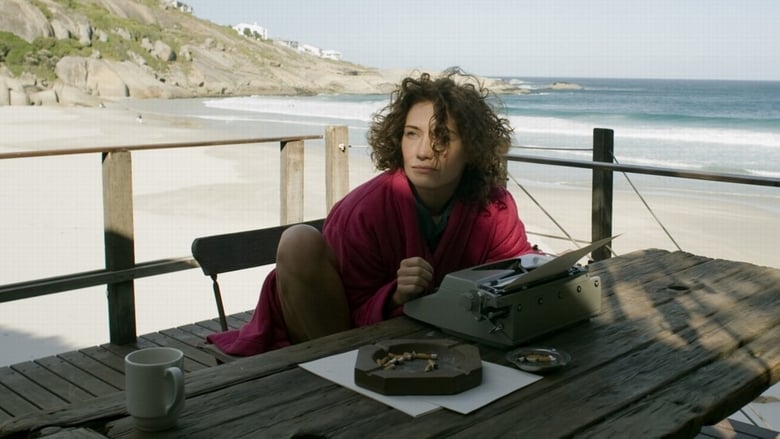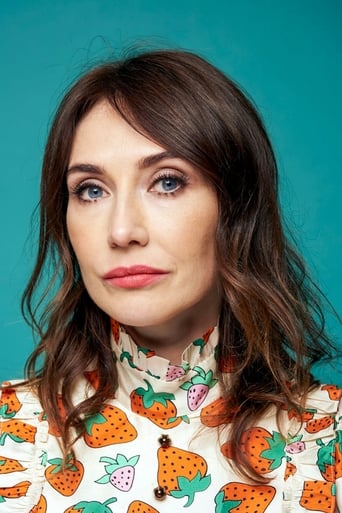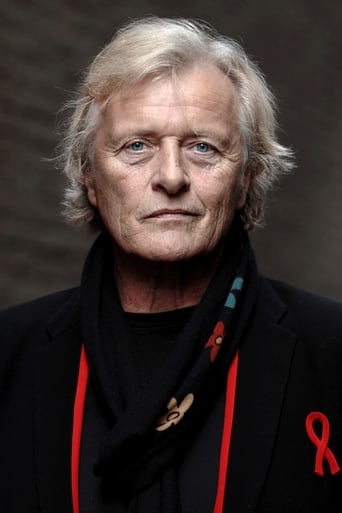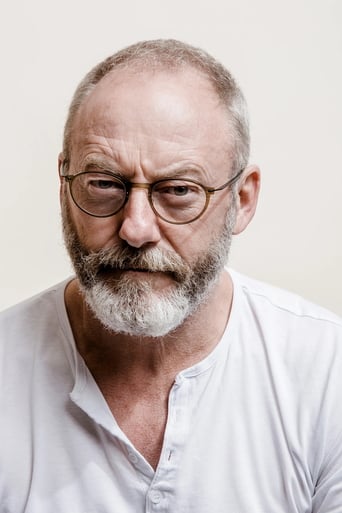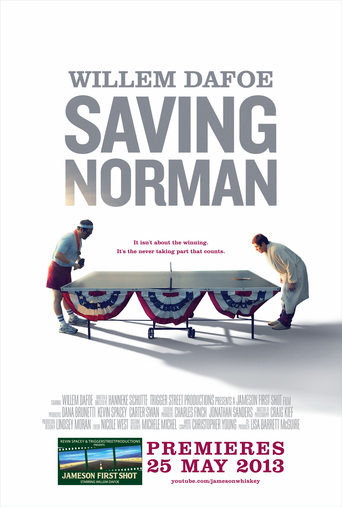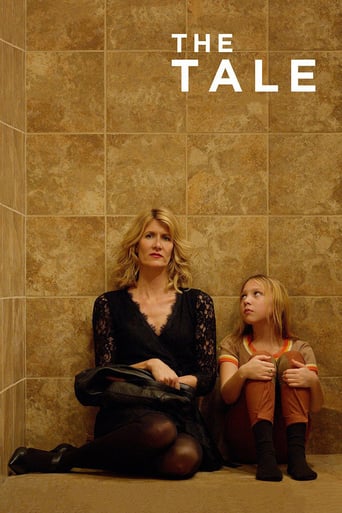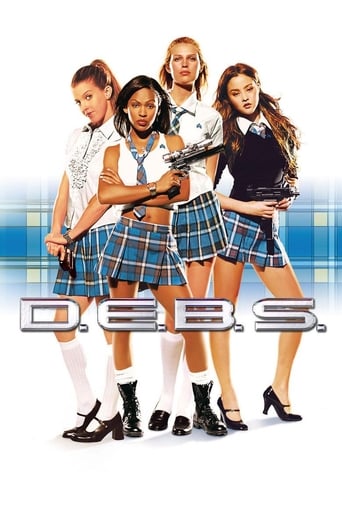Black Butterflies (2011)
Confronted by Apartheid and a father who was Minister of Censorship, Ingrid Jonker searched for a home, searched for love. With men like Jack Cope and André Brink she found much love, but no home. Later, in his first speech to the South African Parliament Nelson Mandela read her poem "The Dead Child of Nyanga" and addressed her as one of the finest poets of South Africa.
Watch Trailer
Cast


Similar titles
Reviews
Entertaining from beginning to end, it maintains the spirit of the franchise while establishing it's own seal with a fun cast
The film may be flawed, but its message is not.
One of the most extraordinary films you will see this year. Take that as you want.
It's the kind of movie you'll want to see a second time with someone who hasn't seen it yet, to remember what it was like to watch it for the first time.
Black Butterflies, a picture of the life of Ingrid Jonker (Carice van Houten) in South Africa during the years of Apartheid is a movie that leaves many impressions. She was a poet & the daughter of a South African MP or representative of an electoral district. Born to privilege, her mother died in an asylum she herself would later be admitted to herself. She showed signs of mental illness all her life & spent many of her days self medicating with sex & alcohol. Yet her talent with words is well documented in her poems.Being in conflict with her father's political beliefs she suffered an estrangement from him even when in the same room. It is well known that daughters who fail to receive the love they need from living fathers often turn to other men for love & approval. Sex, being the mechanism they try to use to obtain that that they lacked growing up, creating unstable relationships in their adult life too. They become a burden to those around them & not the first person you'd seek as a friend. Her choices as an adult leave a lot to be desired. Even her own daughter who she chose to leave motherless was used more as a crutch than an object of love & responsibility.She lived a life of mental turmoil in a country of extreme prejudice & hated that inequality. Unable to forget or assuage the pain of her circumstances, that pain grew over the years to choke her. Yet she became the voice of those that were declared less than human by her father's beliefs. A poem of hers was read at the first democratically elected South African Congress. It begins, "The child is not dead" She took her own life after having withstood all the pain & confusion she could in this life & that will always be controversial in this world. Who is to judge how a person that retains constant contact with mental agony so that it builds in them year by year with little or no relief is to be seen? We call those that overcome such circumstances heroes & hope we are like them. Yet those that see the inequities in this world & summarily reject such things for themselves while seeing them clear enough to describe them in verse, having those things enter their mind through their eyes on a daily basis, what can we say of them. Ingrid was a load to carry if you knew her & quite frankly I'm glad I didn't. I'm no fan of suicide either but I find more sorrow than condemnation in her passing. It is for certain that the people of a South Africa free of Apartheid see her as worthy of praise.Carice van Houten is excellent in portraying a life made of & lived by confusion. Rutger Hauer as her father & Liam Cunningham as her main love in life are strong in their roles as well. There is little in this movie that is shot as pretty or engaging scenery with the exception of the ocean. It's not intended to be pretty either in appearance or portrayal. Nudity is included but it is tastefully done. I was tempted to turn this off early on while they were displaying Ingrid's choices in life. It was a difficult watch to get through because of my dislike for her personality & life but I was glad I hung in till the end. I give it 4 out of 5 Amazon stars overall. 5 out of 5 for making me think through my reactions to it.It only rates 6.2 at IMDb but I think a lot of people quit on this one & rated it anyway.
BLACK BUTTERFLIES is a biographical drama based on the life of Ingrid Jonker. For those who are unfamiliar with this poet the following description my aid in the appreciation of this film: 'Ingrid Jonker (19 September 1933 - 19 July 1965) was a South African poet. Although she wrote in Afrikaans, her poems have been widely translated into other languages. Ingrid Jonker has reached iconic status in South Africa and is often called the South African Sylvia Plath, owing to the intensity of her work and the tragic course of her turbulent life. Her work has also been compared to that of Anne Sexton.' Greg Latter has written the screenplay that attempts to give us all the facets of this enigmatic personality and the film is directed by Paula van der Oest. It is obviously an act of love.We meet Ingrid and her sister Anna as children, poor, without shoes, and taken to the home of their Apartheid father Abraham Jonker (Rutger Hauer) the Minister of Censorship for the parliament of South Africa. As Ingrid (Carice van Houten) matures she becomes a beautiful, but impetuous young poet, feeling abandoned, blaming others, promiscuous, escaping in excessive drinking too much in order to feel safe and able to cope, and becoming overwhelmed by conflicting emotions, which characterize some common personality disorders. At her father's demand she married Pieter, has a daughter by him, and leaves him because she feels trapped. While swimming in the ocean she nearly drowns but is saved by writer Jack Cope (Liam Cunningham) - this act results in a love relationship and despite Jack's decaying marriage they plan to live together. They both support the young South African poet Nkos (Thamsanqua Mbongo) and aid his escape form South Africa to Europe in hopes of finding freedom to write. Ingrid's and Jack's relationship is passionate and stormy: Ingrid has affairs simply because she has the freedom of mind to do so, and the affair with one Eugene Maritz (Nicholas Pauling), a married man, drives Jack away. Ingrid aborts the child she conceived with Jack (Jack does not know this) and eventually does the same with a child conceived with Eugene. All the while Ingrid is suffering form her inner demons but at the same time becoming more aware of the cruelty of Apartheid. Her writings reflect these feelings and are censored by her father. Yet her greatest collection of poems about the Apartheid are published despite her father's wishes and her father disowns her for being a wasted 'slut.' Ingrid's increasingly bizarre behavior results in several psychiatric hospitalizations and suicide attempts and she goes to Paris where she is treated with electroconvulsive therapy. The treatment calms her but robs her of the ability to write poetry and during the night of 19 July 1965, Jonker went to the beach at Three Anchor Bay in Cape Town where she walked into the sea and committed suicide by drowning.Carice van Houten, Liam Cunningham, and Rutger Hauer offer brilliant performances and the support cast is strong - Candice D'Arcy as Ingrid's sister Anna, Grant Swanby as Jan Rabie, and Graham Clarke as Jack's closest mate Uys Krige. During the film's credits we hear Nelson Mandela reading Ingrid's prize winning poem 'The Dead Child of Nyanga', probably the most important poem to influence the end of Apartheid.She searched for a home, she searched for love. Confronted by Apartheid and a father who was Minister of censorship. With men like Jack Cope and Andre Brink she found much love, but no home. In his first speech to the South African Parliament Nelson Mandela read her poem "The Dead Child of Nyanga" and addresses her as one of the finest poets of South Africa. The child is not dead The child lifts his fists against his mother Who shouts Afrika ! shouts the breath Of freedom and the veld In the locations of the cordoned heartThe child lifts his fists against his father in the march of the generations who shouts Afrika ! shout the breath of righteousness and blood i n the streets of his embattled prideThe child is not dead not at Langa nor at Nyanga not at Orlando nor at Sharpeville nor at the police station at Philippi where he lies with a bullet through his brainThe child is the dark shadow of the soldiers on guard with rifles Saracens and batons the child is present at all assemblies and law-givings the child peers through the windows of houses and into the hearts of mothers this child who just wanted to play in the sun at Nyanga is everywhere the child grown to a man treks through all Africathe child grown into a giant journeys through the whole world Without a passThis is a courageous and deeply moving film about a great poet. Grady Harp, April 12
This review was made for Cambridge Film Festival (UK) - 15 to 25 September 2011* Contains spoilers *As expected, Liam Cunningham (as Jack Cope) was excellent, but Carice van Houten, playing poet Ingrid Jonker, was a revelation. To those in the know, she perfectly carried out a role that betrayed the traits of impetuosity, feeling abandoned, blaming others, promiscuity, drinking too much in order to feel safe and able to cope, and becoming overwhelmed by conflicting emotions, which characterize some common personality disorders (they would probably have called them neuroses then).Yet, as is by no means inconsistent, her character was delightful, and she filled the screen with feeling, from seducing Jack, and showing the characters' hunger for each other in the very beautiful sex-scenes, to hurling objects at him with extreme force. There are claims that she has had other lovers, but Eugene and Jack, the ones who are definite, both find her draining, as well they would. A force for life is hard to live with, after all.Rutger Hauer as Ingrid's father (eerily resembling my former university tutor facially) has a harsh love (eventually, on account of her alleged sleeping around, he dismisses her as a slut), likely to have been one of the things that contributed to how she reacts to life and, through doing so in later life, the three psychiatric admissions that we see (or hear of), the last of them leading to electroconvulsive therapy (ECT). Although it is not always true that people are never the same after it, she is damaged.She is also damaged by the child whom she wished she had kept, and by the one fathered by Eugene, and which led her to desperate steps in Paris and that last admission. Whereas the film does not pretend to portray Ingrid's life or that of others who were close to her faithfully, hearing Carice (and, against his judgement, her character's father) read her verse will encourage a journey to look out her writing, not least given that is was allowed such a prominent place in the new South Africa.Maybe the real Ingrid wrote on the walls, maybe she didn't, but it set up a world in which desperate words written in the condensation in Paris were hurtingly real, and also tragically echoed her having made love to Jack in her old room at her father's house (the old servants' quarters), their bodies touching and mingling with her script.Not exactly a love-story, through she clearly does love Jack (but cannot be 'faithful'), but one about what it is to feel, love and live, and to write faithfully what one believes in, whatever the cost.
A middle aged writer rescues a young woman from drowning near the shores of South Africa. Although he is much older, they fall in love right there and then and soon some obvious complications ensue. There is hardly a likable or interesting character in this wandering historical drama about the poet Ingrid Jonker (Carice van Houten). It deals primarily with the mentally troubled writer and her precarious relationships with men, including her father (Rutger Hauer) who is a member of the apartheid regime she strongly opposes. The film never picks up any speed and the absence of a discernible plot line or a compelling narrative makes for a very pallid viewing experience. Hauers script is particularly one-note but the same could be said of van Houten who seemed to be out of her depth in the role of a frustrated and depressed young woman trying to get her voice heard through rebellious poetry. Liam Cunningham fares a lot better as one of the two love interests and produces the only sympathetic character of the film.

